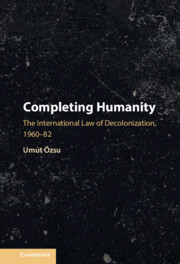Book contents
- Completing Humanity
- Completing Humanity
- Copyright page
- Dedication
- Epigraph
- Contents
- Acknowledgements
- Note on Terminology and Translations
- Table of Cases
- Table of Treaties and Other Instruments
- Table of Resolutions
- Table of Domestic Statutes
- Abbreviations
- Introduction
- 1 Fixing Selves
- 2 Forging Universals
- 3 Redistributing Resources
- 4 Pooling Rights
- 5 Righting Markets
- Conclusion
- Bibliography
- Index
Conclusion
Published online by Cambridge University Press: 16 January 2024
- Completing Humanity
- Completing Humanity
- Copyright page
- Dedication
- Epigraph
- Contents
- Acknowledgements
- Note on Terminology and Translations
- Table of Cases
- Table of Treaties and Other Instruments
- Table of Resolutions
- Table of Domestic Statutes
- Abbreviations
- Introduction
- 1 Fixing Selves
- 2 Forging Universals
- 3 Redistributing Resources
- 4 Pooling Rights
- 5 Righting Markets
- Conclusion
- Bibliography
- Index
Summary
Critics of international law have traditionally focused on the weakness of its enforcement mechanisms. On this view, the main problem with international law is that it lacks the sort of effective power needed for its ‘normative authority’ to mean something in a world of bullets and borders. The problem, in other words, is that international law is not ‘really law’, at least not of a sort that is likely to be backed up with coercive force. Other critics have focused on the question of whether international law is anywhere as ‘international’ as its champions have made it out to be. From this perspective, the real difficulty stems not so much from a lack of real enforcement, nor even from the problem of determining what kind of legal status should be ascribed to ‘rules’ that are often anything but rule-like and ‘norms’ that do not appear to be especially normative. Rather, the difficulty is that international law often falls short of the universality its supporters and detractors both ascribe to it. International law may well be ‘law’, whatever precisely that means, but it cannot justifiably be characterized as ‘international’.
- Type
- Chapter
- Information
- Completing HumanityThe International Law of Decolonization, 1960–82, pp. 240 - 245Publisher: Cambridge University PressPrint publication year: 2023

